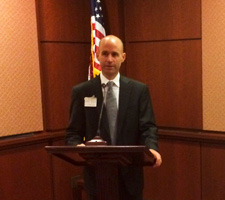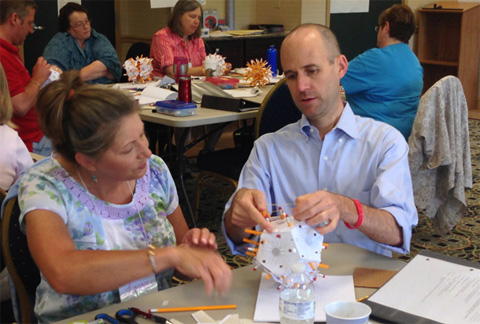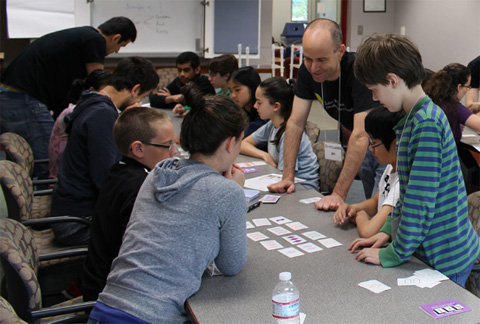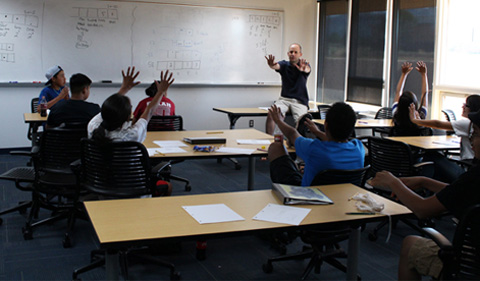By Angela Woodward
From Compass
Dr. Robert Klein has spent nearly 10 years educating and mentoring students in Ohio University math and math education courses. But Klein’s hours outside of the classroom are spent inspiring, empowering and advocating on behalf of math students and educators throughout the nation – efforts that in the past year have taken him from Bobcat Nation to the Navajo Nation to Capitol Hill.

Associate Professor of Mathematics Bob Klein presents at a briefing on Capitol Hill highlighting key findings in a report Klein helped compile on issues facing rural education in the United States.
Klein joined the staff of Ohio University’s Department of Mathematics in the fall of 2005. Klein, Associate Professor of Mathematics, currently serves as the department’s chair of undergraduate studies.
Klein admits he wasn’t always a fan of math. In fact, in high school he didn’t really enjoy math until he took calculus.
“I found the development of theory, the way the pieces of calculus just fit together, to be wonderful,” he explained. “It’s such a playground of the mind.”
Making a Difference in Southeast Ohio
For the past two years, Klein has been partnering with colleagues, area educators and a host of supportive individuals to create opportunities for play in the world of mathematics for both math teachers and students in Southeast Ohio.
In the summer of 2012, Klein and a group of local math educators attended an American Institute of Mathematics’ workshop titled, “How to Run a Math Teachers’ Circle.” Aimed at improving math education in middle schools, math teachers’ circles bring middle school teachers and professional mathematicians together to enrich the teachers’ experience of mathematical problem solving and to build a sort of mathematical community.
Klein and three teachers from Athens City Schools, Katie Hendrickson, Susan Matters and Nina Sudnick, co-founded the Southeast Ohio Math Teachers’ Circle (SEOMTC) in March 2013. The SEOMTC is open to educators teaching third- through eighth-grade math who meet regularly – including during a four-day summer immersion workshop – with OHIO faculty and other math professionals to explore what Klein described as “fun, engaging and meaningful mathematics problem solving.”
“The key objective in our teachers’ math circle, and in any math circle, is to immerse yourself in a problem, to give yourself the freedom to enjoy spending an hour or longer thinking deeply about a particular problem,” Klein explained. “For mathematics professionals, this is an opportunity to share the joy that they feel when they do investigations or research. That’s not something we often get. There’s not the space for that kind of work in typical school curriculum.”

During a gathering of the Southeast Ohio Math Teachers’ Circle, Bob Klein works with Laurie Campitelli from East Elementary School in Athens to assemble a “pencilcosa,” a dodecahedron made of pencils and rubber bands.
More than 45 area teachers have participated in the SEOMTC, and the program’s summer immersion workshop has attracted math educators from throughout Ohio.
“The response has been overwhelmingly positive,” said Sudnick, a math/science teacher and math coach at West Elementary School in Athens. “Dr. Klein has done an excellent job of generating and procuring rich math tasks and has also brought in mathematicians from Ohio, the United States and the world to share mathematical ideas and tasks with the area teachers. The teachers have given positive feedback through our formal feedback mechanisms, and, more importantly, they return to the SEOMTC sessions time and again while bringing along new peers.”
While the SEOMTC’s website emphasizes that the program is not professional development but rather doing math for fun with individuals who share the same passion, the teachers who participate in SEOMTC are growing professionally.
“All of the rich math tasks that we do and ideas that are generated from those tasks can be taken from our workshop right into the classroom,” said Sudnick, who noted the role Klein has played in her growth as a mathematics educator. “Dr. Klein’s commitment to the local community and to the math education profession goes above and beyond. … We are extremely appreciative of all that he does to make Southeast Ohio a premiere mathematics community.”
Having started a program aimed at nurturing local math educators, Klein began looking at the other side of the equation: math students.
Klein had been toying with the idea of starting a math circle for Athens-area students. That idea was re-energized after he attended the National Association of Math Circles’ “Circle on the Road” workshop in Puerto Rico in January 2013 and actually came to fruition when, upon his return from Puerto Rico, he heard a knock on his office door.
It was Javier Ronquillo Rivera, a PhD student in OHIO’s math department. Ronquillo, who is from Guatemala and both competed in and coached the Guatemalan International Mathematics Olympiad team, asked Klein if he could develop a program similar to the Olympiad team in Southeast Ohio.
“As I learned more about math circles, I really liked the idea of them because while I really enjoyed the Mathematics Olympiad team, it could sometimes be too competition-driven,” said Ronquillo, who coached the team for five years. “With the math circles, it’s more about making math a cultural experience, applying math in your daily life, and being able to enjoy math, and to me those are the most important things.”
Klein and Ronquillo co-founded the Math League of Southeast Ohio, a superhero-themed math circle for students in grades 6-9. Every other Saturday, the Math League meets at the Athens Community Center to tackle math problems that are meant to stimulate thinking and to explore mathematical concepts that can be applied to other fields of science.
“You’ve got these 11-year-olds who think they’re just having fun developing these ideas,” Klein said. “In reality, they are standing at the very frontiers of mathematics.”

Bob Klein works with Math League participants (from left) Brandon, Maya, Jonathan and Garey on Geometry of the SET game.
Ana Rosado Feger, an associate professor of operations management in OHIO’s College of Business, knows full well the opportunity the Math League provides to area students. Feger is president of the Athens Association for Gifted Children, which is dedicated to providing educational opportunities in the Athens area and is an administrative co-sponsor of the Math League.
“I was interested in bringing math circles to Athens because we have a significant number of middle school-aged students in Southeast Ohio who are participating in organized competition math,” Feger said. “I knew these kids would benefit from the math circle problem-based approach to building mathematics knowledge, beyond practicing skills.”
Feger has also seen the effect the Math League has had on her son, Christopher, a ninth-grader at Athens High School who is participating in his second year in the program.
“Math League was definitely a highlight of the past academic year,” Feger said. “Christopher had an opportunity to experience using math as a tool of exploration and not just as skills to learn. He also had a chance to work with both peers and younger students in an atmosphere which allowed everyone to learn from each other and build on each other’s contributions.”
Christopher enjoyed the experience so much that this year he is participating in two math circles: the local Math League and the Columbus Math Circle, which caters to high school students. Christopher’s enthusiasm for the Math League has also piqued the interest of his younger brother, 9-year-old Ryan, who will be joining the league this year.
“For student participants, Math League represents an opportunity to experience math as mathematicians do,” Feger said. “It is additionally an opportunity for them to meet others with similar interests in an environment that encourages them to learn and grow.”
And while Ronquillo noted that only time will tell how the Math League influences its participants’ future academic success, he sees the effect it is having today.
“We are spending time doing math, and these kids keep coming, and they’re happy, and they’re excited about doing math, and you can just see it on their faces,” said Ronquillo, who also noted the difference the Math League has made in his life.
“The Math League has given me a model I’m more comfortable with because it’s not about competing. It’s about working together,” he said. “It’s also given me a place to explore my creativity and apply my passion for not only math and teaching, but also my interests in theater.”
Making a Difference in the Southwest
The Math League wasn’t the only thing to result from Klein’s 2013 trip to Puerto Rico. While attending the “Circle on the Road” there, he heard a presentation on the Navajo Nation Math Circle Project (NNMCP).
The project aims to develop and demonstrate the math circle concept in the Native American community, while simultaneously creating a mentor network for community members – all with an overarching goal of recruiting more Native Americans into the STEM fields.
“It is a great project, and I was so impressed with what they are doing,” Klein said of the NNMCP. “But I know from our work with math circles that to be sustainable you have to have a big group of people committed to it. The Navajo Nation Math Circle Project was a place where I felt that I could contribute and where I really wanted to contribute. I grew up in Albuquerque, New Mexico, so the Southwest United States was my first home.”
Klein approached one of the co-directors of the NNMCP, Tatiana Shubin of San Jose State University, and asked how he could help. When he saw Shubin again at a Joint Mathematics meeting, she took Klein up on his offer.
Klein is now one of four co-directors of the NNMCP, joining Shubin, Henry Fowler from Diné College, and David Auckly from Kansas State University.
As co-director of the NNMCP, this past July Klein helped operate the project’s summer math camp, a two-week non-residential camp offered to about 30 students, grades 6-12, from throughout the Navajo Nation. The students are bused in every day for the program, which is hosted by Diné College in Tsaile, Ariz. A network of dozens of mathematicians contributes to the program, which just concluded its second year.
Klein described the time he spent working in the Navajo Nation as extremely rewarding.
“The entire area was simply amazing – from the scenery to the people,” he said. “The Navajo people we met were giving and friendly as well as very interested in having their children participate in our program and very grateful for the efforts we gave.”
In addition to exploring mathematics problem-solving, the summer camp also features prominent Native American professionals working in the STEM fields who serve as role models and talk to the students about opportunities that are available to them. And, a unique aspect of the summer camp is that while most of the time at camp is devoted to math, one-third of the program is set aside for instruction in Navajo language and culture.
“Their language is one of those things that is dying out, and it’s not a particularly easy language to master,” Klein explained, noting the efforts he’s taken to pick up bits and pieces of the vernacular.
In addition to assisting with the NNMCP summer camp, Klein has also participated in fundraising efforts for the program and in generating scripts that can be used to help guide educators interested in starting their own math circles.
The NNMCP has attracted the attention of a documentary filmmaker. George Csicsery of Zala Films spent time this past summer in the Navajo Nation filming footage for a documentary he is developing on the math circle project. Among the individuals he interviewed for the film was Klein.
Advocating for Teachers, Students Nationwide
In addition to his work with various math circles, Bob Klein also dedicates much of his time to advocating on behalf of math students and educators at various level of government.
Klein sits on the Ohio Department of Education’s House Bill 1 Advisory Panel and was recently appointed to his second two-year term on the department’s Educator Standards Board. Klein also chairs the editorial panel of Mathematics Teaching in the Middle School, an official peer-reviewed journal of the National Council of Teachers of Mathematics.
But it was research he and a colleague helped compiled on rural education that brought the pair to a Capitol Hill briefing in July.
Having grown up in New Mexico, Klein was familiar with issues facing rural education, but that awareness took on new meaning when he moved to Appalachia to accept his teaching position at OHIO.
“I’ve always been fascinated by issues of diversity, access and populations whose voices were not well represented in mathematics,” Klein said. “When I moved here, it was very clear that few were talking about rural issues in mathematics education in particular, so that became an instant passion of mine.”
At OHIO, Klein found a number of professionals just as committed as he at delving into the challenges facing rural education. One of those individuals is Daniel Showalter, Klein’s former PhD student who is now a visiting assistant professor of mathematics at OHIO.
“I entered graduate school six years ago full of questions about where my life would go professionally,” Showalter said. “Bob regularly set aside time – even when he was overwhelmed with other responsibilities – to help me process these questions. … As I look over the pages of the CV I’ve built over the past six years, I can trace almost every publication, award and experience back to a person or opportunity that Bob introduced me to.”
In the past year, Klein and Showalter joined other professionals in compiling a report, “Why Rural Matters 2013-14,” for the Rural School and Community Trust, a national nonprofit organization dedicated to addressing the relationship between effective schools and thriving communities. The biennial report analyzes the contexts and conditions of rural education in each of the country’s 50 states in order to highlight the priority policy needs of rural publicly funded schools and the communities they serve.
Klein and Showalter were invited to present a briefing on the report on Capitol Hill this past July. Among the report’s key findings:
The number of rural students is increasing.
The rural student population is becoming more diverse.
The poverty rate among rural students has increased by more than 10 percent since 2000.
Critical intervention services are necessary to improve the future of rural education.
Showalter said the briefing was well-attended by Congressional staff and representatives from national organizations. In addition to drawing attention to the health of rural education across the U.S., Showalter said another goal of the briefing was to encourage Congress to pass the All Children Are Equal Act, which would change the formula of Title I federal funding to distribute more funding to high-poverty schools in both rural and urban areas.
When asked what Klein’s work has meant to math educators and students, Showalter said: “Bob has made a lasting impact on the local, state and national communities of mathematics educators and students. His unique combination of wit, mathematical insight and social awareness allows him to sense where a person is emotionally and mentally as they approach a math problem. He then uses this knowledge to help them find a path to understanding the concepts behind the problem. … Bob is also a social connector. … Not only is he a visionary, but he knows many visionaries, and he has the exceptional ability to weave these visions together in ways that benefit everyone involved – from the individuals to the entire field of mathematics education.”
Making a Difference in the Years to Come
Klein and the individuals with whom he partners on these initiatives know their work is not yet complete.
Klein plans to return to the Navajo Nation for next summer’s math camp and at some point hopes to take some Ohio University students with him.
In addition, the reach of the Math League of Southeast Ohio is likely to extend beyond U.S. borders in the months to come. Ronquillo is translating the group’s work into Spanish to help establish a sister math circle in his home country of Guatemala. And, Rebin Muhammad, an OHIO graduate student who helps facilitate the Math League, has been translating the work into Kurdish in hopes of starting a math circle in his home country of Kurdistan.
“From my very first semester here, Bob has been just a really good guide and mentor,” Ronquillo said, noting the efforts Klein made to help him adjust when he first moved to the United States to attend OHIO. “But most importantly, he is a true friend. He has invited me to his family’s Thanksgiving. He has invited me to different math activities that have helped me grow as a teacher and mathematician. And he’s just a really kind person. All of those things are huge when you’re far away from your home country and from your family.”




















Comments